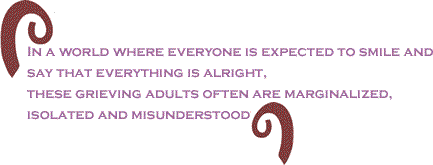
|
|||||||||||||||||||||||

|
|

Custom Search
|
|
 |
|
There is perhaps no greater depth of sorrow one can experience than the loss of one’s child. It is the type of feeling that you would not wish on your worst enemy. Regardless of the age of death – whether a baby, a child or adult - or the circumstances - death in utero, or by car accident, gun violence, suicide, domestic violence, war, illness, what have you - the pain is just as real for the parent, and just as cripplingly intense. Not seeking membership in this cruel, tragic club, those who have experienced the death of their child (there is no appropriate descriptive term for them, such as orphans, widows or widowers) are members of a secret society. Sometimes it feels not unlike the functional equivalent of a leper colony. And in a world where everyone is expected to smile and say that everything is alright, these grieving adults often are marginalized, isolated and misunderstood. Authors Suzanne Redfern and Susan K. Gilbert, who
are themselves the surviving parents of lost children, have compiled
the experiences of grieving parents in The
Grieving Garden: Living with the Death of a Child
And often for some, there is far less tolerance for exchanging pleasantries, keeping up appearances and cooperating with the plasticity and fakeness of some social interactions, as one woman suggested:
As one parent in the book noted, “Some of us felt burdened by expectations that we should just ‘get over it.’” (p. 69) In reality, there is no such thing as getting over it, getting over the guilt, sorrow, anger, and other emotions which come and go without warning and without reason or rhyme. Rather, there is a “silver cord,” as the writers of The Grieving Garden discuss, which forever binds the grieving parent to the child who has passed. These parents find a way to keep on living, yet to remember and honor their child’s life through rituals such as the lighting of a candle. Holidays, birthdays and anniversaries can be particularly hard for such families. The experience of losing a child may be likened to someone yanking your heart out of your chest, stomping on your heart, and then handing it back to you. It is particularly cruel because you are deprived of the opportunity to use your parental instincts, to protect your child from danger, and to see his or her potential realized. I was particularly moved by the story of a woman who dreamt of seeing her dead son:
I am really sorry, Danny and Jen and Cassie, that Sean cannot play with you anymore. I am really sorry, Jeremy, Matt and Elvin. I am really, really sorry, Sean.” (pp. 175-76) If you have not experienced the loss of a child,
I pray you never will. But regardless, I recommend to you The Grieving
Garden. BlackCommentator.com Editorial Board member David A. Love, JD is a lawyer and journalist based in Philadelphia, and a contributor to the Progressive Media Project, McClatchy-Tribune News Service, In These Times and Philadelphia Independent Media Center. He contributed to the book, States of Confinement: Policing, Detention, and Prisons (St. Martin's Press, 2000). Love is a former Amnesty International UK spokesperson, organized the first national police brutality conference as a staff member with the Center for Constitutional Rights, and served as a law clerk to two Black federal judges. His blog is davidalove.com. Click here to contact Mr. Love. |
|
Any BlackCommentator.com article may be re-printed so long as it is re-printed in its entirety and full credit given to the author and www.BlackCommentator.com. If the re-print is on the Internet we additionally request a link back to the original piece on our Website. Your comments are always welcome. eMail re-print notice
If you send us an eMail message we may publish all or part of it, unless you tell us it is not for publication. You may also request that we withhold your name. Thank you very much for your readership. |
|
| |
|
| December 11, 2008 Issue 303 |
|
| Executive Editor: Bill Fletcher, Jr. |
| Managing Editor: Nancy Littlefield |
| Publisher: Peter Gamble |
| Est. April 5, 2002 |
Printer Friendly Version
in resizeable plain
text format or pdf
format. |
| Frequently Asked Questions |
 |

|
 |
 |
 |
| |
| |






























 As
The Grieving Garden points out, there is no one proper way to grieve
(except maybe to not to allow yourself to grieve at all), as this
will depend on the individual parent. But this is certain: membership
in the club of bereaved parents is a transformative experience.
Those who emerge from the depths of despair are not the same people
they once were before their loss. They are changed forever. Some
find their faith in God and religion strengthened, while others
conclude that God is dead, or that God betrayed them. After all,
they posit, how could a Supreme Being be so cold-blooded, so ruthless
as to take one’s child? Others become much more spiritual beings,
in tune with their feelings and sensitive to the concerns and needs
of others, and most of all, very aware of the presence of their
child’s spirit. A number of parents even hope to be reunited with
their children. New priorities and new careers are created in the
process - stockbrokers, scientists and office managers turn into
artists, writers and social service counselors.
As
The Grieving Garden points out, there is no one proper way to grieve
(except maybe to not to allow yourself to grieve at all), as this
will depend on the individual parent. But this is certain: membership
in the club of bereaved parents is a transformative experience.
Those who emerge from the depths of despair are not the same people
they once were before their loss. They are changed forever. Some
find their faith in God and religion strengthened, while others
conclude that God is dead, or that God betrayed them. After all,
they posit, how could a Supreme Being be so cold-blooded, so ruthless
as to take one’s child? Others become much more spiritual beings,
in tune with their feelings and sensitive to the concerns and needs
of others, and most of all, very aware of the presence of their
child’s spirit. A number of parents even hope to be reunited with
their children. New priorities and new careers are created in the
process - stockbrokers, scientists and office managers turn into
artists, writers and social service counselors. Moreover,
there are many awkward and inappropriate comments that friends,
coworkers and acquaintances may make to bereaved parents, such as
“are you better yet?”, or “you’re so lucky that God wanted him,”
or “it was for the best,” or “you can always have another child.”
After telling an acquaintance that her child had died, one contributor
to the book was told that “Kroger has a special on Saltine crackers.”
Some people just don’t know what to say or how to say it. Others
prefer to maintain their silence and fail to acknowledge what occurred.
Death, after all, is not an easy subject for many. While such a
tragedy has the potential to strengthen friendships, it also causes
many people to run in the opposite direction, both figuratively,
and literally (in supermarkets and other public places).
Moreover,
there are many awkward and inappropriate comments that friends,
coworkers and acquaintances may make to bereaved parents, such as
“are you better yet?”, or “you’re so lucky that God wanted him,”
or “it was for the best,” or “you can always have another child.”
After telling an acquaintance that her child had died, one contributor
to the book was told that “Kroger has a special on Saltine crackers.”
Some people just don’t know what to say or how to say it. Others
prefer to maintain their silence and fail to acknowledge what occurred.
Death, after all, is not an easy subject for many. While such a
tragedy has the potential to strengthen friendships, it also causes
many people to run in the opposite direction, both figuratively,
and literally (in supermarkets and other public places). 






